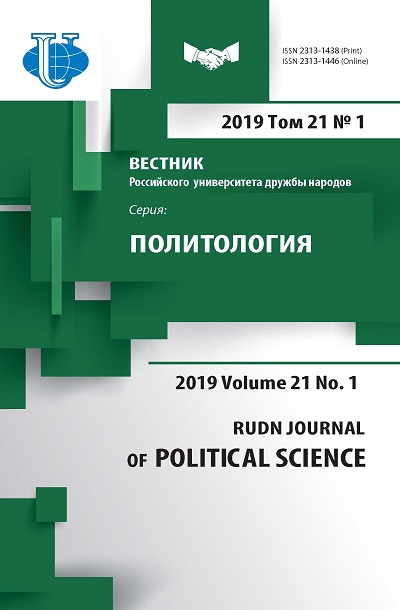REHABILITATION OF THE NAZI REGIME, ITS SUPPORTERS AND ACCOMPLICES IN THE EUROPEAN CINEMATOGRAPHY: CURRENT STATE AND NEW TRENDS IN DEVELOPING MEMORY POLICIES
- Authors: Belov S.I1
-
Affiliations:
- Central Museum of the Great Patriotic War 1941-1945
- Issue: Vol 21, No 1 (2019)
- Pages: 110-117
- Section: CURRENT PROBLEMS OF POLITICAL SCIENCE
- URL: https://journals.rudn.ru/political-science/article/view/20979
- DOI: https://doi.org/10.22363/2313-1438-2019-21-1-110-117
Cite item
Full Text
Abstract
The presented study is dedicated to the rehabilitation of the Nazi regime, its supporters and accomplices in modern cinema as part of the memory policy. The relevance of this work is determined by the growing influence of ultra-right politicians in a number of economically developed countries, an increase in the number of memorial wars due to the rehabilitation of Nazism accomplices and the spread of right-wing radicalism in the United States and European Union states. The aim of the study is the evaluation of the rehabilitation practices of Nazism and its supporters in new motion pictures, which have not been previously studied by representatives of the expert community from this perspective. Indirect apologetics of the Nazis and their adherents, including representatives of organizations recognized as criminal in accordance with the decision of the Nürnberg Tribunal, are widespread in modern cinema. The thesis is being promoted that even numerous members of organizations recognized as criminal secretly opposed the Nazi regime. Cooperation is considered as a necessary measure. The audience gets the impression that even highranking representatives of the army leadership were not aware of war crimes. People who for many years supported Hitler’s regime are shown as its victims. There have been attempts to re-evaluate certain aspects of the Nazi regime as a positive experience, in a way of referring to actual matters nowadays.
Keywords
About the authors
Sergey I Belov
Central Museum of the Great Patriotic War 1941-1945
Author for correspondence.
Email: belov2006s@yandex.ru
PhD in History, Scientific Secretary of Central Museum of the Great Patriotic War 1941-1945
10, Bratiev Fonchenko str., 121170, Moscow, Russian FederationReferences
- Achkasov V.A. “Politics of Memory” as a Tool for Building Post-socialist Nations. ZHurnal sociologii i social'noj antropologii. 2013; Vol. XVI; 4: 106—123 (In Russ.).
- Belov S.I. the Image of the Red Army during the Great Patriotic War in German Cinema in the 2000s: The Content and Factors of Genesis. Informacionnye vojny. 2018; 1 (45): 79—83 (In Russ.).
- “God, how many Nazis”: Europe Scared of the Huge White March. RIA Novosti. 13.11.2017. Available from: https://ria.ru/analytics/20171113/1508660994.html. Accessed: 08.11.2018 (In Russ.).
- Captain. Kinopoisk. Available from: https://www.kinopoisk.ru/film/kapitan-2017-1048214/. Accessed: 08.11.2018 (In Russ.).
- Comment by the Department of Information and Press of the Russian Foreign Ministry on the Adoption in the Third Committee of the 72nd session of the UN General Assembly Resolution on Combating the Glorification of Nazism. Available from: http://www.mid.ru/foreign_policy/ news/-/asset_publisher/cKNonkJE02Bw/content/id/2953418. Accessed: 08.11.2018 (In Russ.).
- Extreme Right even Racist Views Are Becoming Mainstream in Central Europe. Lehaim. 04.04.2018. Available from: https://lechaim.ru/news/krajne-pravye-dazhe-rasistskie-vzglyadystanovyatsya-mejnstrimom-v-tsentralnoj-evrope/. Accessed: 08.11.2018 (In Russ.).
- Max Schmeling: A Soldier of the Reich. Kinopoisk. Available from: https://www.kinopoisk.ru/ film/maks-shmeling-boets-reykha-2010-445338/. Accessed: 08.11.2018 (In Russ.).
- Malinova O.Yu. Theme of the past in the Rhetoric of Russian Presidents. Pro et Contra. 2011; Vol. 15; 3—4: 106—122 (In Russ.).
- Miller A.I. The Role of Expert Communities in the Politics of Memory in Russia. Politiya: Analiz. Hronika. Prognoz (ZHurnal politicheskoj filosofii i sociologii politiki). 2013; № 4 (71): 114—126 (In Russ.).
- Rommel' (TV). Kinopoisk. Available from: https://www.kinopoisk.ru/film/rommel-2012682870/. Accessed: 08.11.2018 (In Russ.).
- He's Back. Kinopoisk. Available from: https://www.kinopoisk.ru/film/907661/. Accessed: 08.11.2018 (In Russ.).
- Kinopoisk. Available from: https://www.kinopoisk.ru/film/799983/. Accessed: 08.11.2018 (In Russ.).
- Belgrade Jews Oppose Rehabilitation of World War II-era Prime Minister. Haaretz. 24.10.2016. Available from: https://www.haaretz.com/world-news/europe/belgrade-jews-oppose-rehabilitationof-world-war-ii-era-prime-minister-1.5452773. Accessed: 08.11.2018.
- “If EU Ignores This — Hitler's Rehabilitation Might Be Next”. B92. 22.06.2016. Available from: https://www.b92.net/eng/news/politics.php?yyyy=2016&mm=07&dd=22&nav_id=98702. Accessed: 08.11.2018.
- Serbs and Croats Clash over Allegations of Nazi Pasts. The Irish Times. 16.05.2015. Available from: https://www.irishtimes.com/news/ireland/irish-news/serbs-and-croats-clash-over-allegationsof-nazi-pasts-1.2214464. Accessed: 08.11.2018.
- The Last Taboo. Will Germany Finally Rehabilitate Nazi-Era ‘Traitors’? Spiegel Online. 28.01.2009. Available from: http://www.spiegel.de/international/germany/the-last-taboo-willgermany-finally-rehabilitate-nazi-era-traitors-a-604076.html. Accessed: 08.11.2018.
















